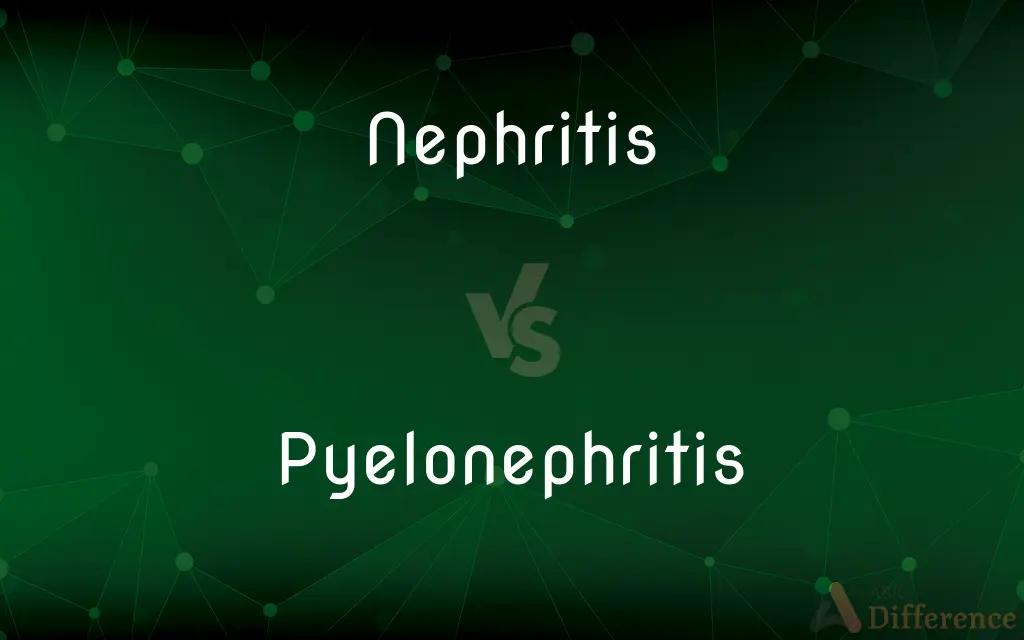Nephritis vs. Pyelonephritis — What's the Difference?
By Fiza Rafique & Urooj Arif — Updated on April 27, 2024
Nephritis refers to kidney inflammation generally, while pyelonephritis specifically indicates a bacterial infection of the kidneys' upper section.

Difference Between Nephritis and Pyelonephritis
Table of Contents
ADVERTISEMENT
Key Differences
Nephritis is a broad term that encompasses various forms of kidney inflammation caused by different factors like autoimmune diseases or infections. On the other hand, pyelonephritis is a type of nephritis specifically resulting from a urinary tract infection that has ascended to the renal pelvis and kidney tissues.
Nephritis can present with symptoms like edema, hypertension, and hematuria, reflecting a generalized inflammatory response in the kidneys. In contrast, pyelonephritis often includes specific symptoms such as fever, flank pain, and painful urination, indicating a more localized infection and inflammation.
The causes of nephritis can vary widely, including non-infectious conditions such as lupus or drug reactions. Pyelonephritis, however, is typically caused by bacteria like Escherichia coli, which travel from the bladder to the kidneys.
Diagnosing nephritis may involve tests, urine analysis, and kidney biopsy to identify the underlying cause of inflammation. Conversely, the diagnosis of pyelonephritis might additionally require imaging studies such as an ultrasound or CT scan to assess the extent of infection and check for obstructions.
Treatment for nephritis depends on the cause but generally includes managing symptoms, controlling blood pressure, and correcting electrolyte imbalances. On the other hand, pyelonephritis treatment specifically requires antibiotics to combat the bacterial infection and may include hospitalization in severe cases.
ADVERTISEMENT
Comparison Chart
Definition
Inflammation of the kidneys from various causes.
Bacterial infection of the kidney's upper parts.
Causes
Autoimmune diseases, infections, toxins.
Primarily urinary tract infections.
Symptoms
Edema, hypertension, hematuria.
Fever, flank pain, painful urination.
Treatment
Depends on cause: medications, lifestyle changes.
Antibiotics, potentially hospitalization.
Compare with Definitions
Nephritis
Kidney inflammation affecting the spaces between renal tubules.
His medication caused interstitial nephritis, leading to temporary kidney dysfunction.
Pyelonephritis
A sudden severe kidney infection.
She was hospitalized for acute pyelonephritis after her urinary tract infection worsened.
Nephritis
A long-term kidney condition marked by inflammation and scarring.
Chronic nephritis can lead to kidney failure if not properly managed.
Pyelonephritis
A rare form of chronic pyelonephritis.
The diagnosis of xanthogranulomatous pyelonephritis was confirmed via imaging and biopsy.
Nephritis
Inflammation of the kidneys that develops suddenly.
He was diagnosed with acute nephritis after experiencing rapid onset of swelling and high blood pressure.
Pyelonephritis
Recurrent or persistent infection of the kidneys leading to scarring.
Chronic pyelonephritis has gradually impaired his kidney function.
Nephritis
Kidney inflammation caused by systemic lupus erythematosus.
She manages her lupus nephritis with immunosuppressive drugs.
Pyelonephritis
Kidney infection specifically caused by bacteria.
Bacterial pyelonephritis is usually treated effectively with antibiotics.
Nephritis
Nephritis is inflammation of the kidneys and may involve the glomeruli, tubules, or interstitial tissue surrounding the glomeruli and tubules. It is one of several different types of nephropathy.
Pyelonephritis
A severe infection with gas-forming bacteria in the kidney.
Emphysematous pyelonephritis is a medical emergency requiring immediate intervention.
Nephritis
Any of various acute or chronic inflammations of the kidneys, such as Bright's disease.
Pyelonephritis
Pyelonephritis is inflammation of the kidney, typically due to a bacterial infection. Symptoms most often include fever and flank tenderness.
Nephritis
(pathology) Inflammation of the kidney.
Pyelonephritis
Inflammation of the kidney and its pelvis, caused by bacterial infection.
Nephritis
An inflammation of the kidneys.
Pyelonephritis
(pathology) An ascending urinary tract infection of the renal pelvis
Nephritis
An inflammation of the kidney
Pyelonephritis
Inflammation of the kidney and its pelvis caused by bacterial infection
Common Curiosities
What triggers pyelonephritis?
It is most often triggered by bacteria, such as Escherichia coli, that ascend from the bladder to the kidneys.
How is pyelonephritis diagnosed?
Diagnosis often involves urine tests to identify bacteria, and imaging tests like ultrasounds or CT scans to assess the kidneys.
What are the symptoms of pyelonephritis?
Common symptoms include fever, flank pain, chills, and painful or frequent urination.
Is pyelonephritis a serious condition?
Yes, it can be severe and lead to serious complications if not treated promptly, including sepsis or kidney damage.
What is pyelonephritis?
Pyelonephritis is a specific type of kidney inflammation caused by a bacterial infection usually originating from a urinary tract infection.
How is pyelonephritis treated?
Treatment typically involves antibiotics to clear the infection, and in severe cases, hospitalization may be required.
What complications can arise from untreated pyelonephritis?
Complications may include renal scarring, kidney failure, or the spread of infection leading to sepsis.
Are there risk factors that increase the likelihood of developing nephritis?
Risk factors include autoimmune diseases, certain medications, and infections that can trigger kidney inflammation.
Can pyelonephritis become a chronic condition?
Yes, if recurrent or improperly treated, it can lead to chronic pyelonephritis, which can cause lasting damage to the kidneys.
What differentiates nephritis from pyelonephritis?
Nephritis is a general term for kidney inflammation due to various causes, whereas pyelonephritis specifically refers to kidney inflammation due to a bacterial infection.
What preventive measures can be taken against pyelonephritis?
Preventive measures include maintaining good urinary hygiene, staying hydrated, and treating any urinary tract infections promptly.
How often should someone with nephritis or pyelonephritis see a doctor?
Regular follow-ups with healthcare providers are crucial for monitoring the condition and adjusting treatment as necessary.
Can children suffer from nephritis or pyelonephritis?
Yes, both conditions can affect individuals of any age, including children, though the causes and treatments may differ based on age.
Share Your Discovery

Previous Comparison
Bright vs. Brilliant
Next Comparison
Conifer vs. JuniperAuthor Spotlight
Written by
Fiza RafiqueFiza Rafique is a skilled content writer at AskDifference.com, where she meticulously refines and enhances written pieces. Drawing from her vast editorial expertise, Fiza ensures clarity, accuracy, and precision in every article. Passionate about language, she continually seeks to elevate the quality of content for readers worldwide.
Co-written by
Urooj ArifUrooj is a skilled content writer at Ask Difference, known for her exceptional ability to simplify complex topics into engaging and informative content. With a passion for research and a flair for clear, concise writing, she consistently delivers articles that resonate with our diverse audience.
















































